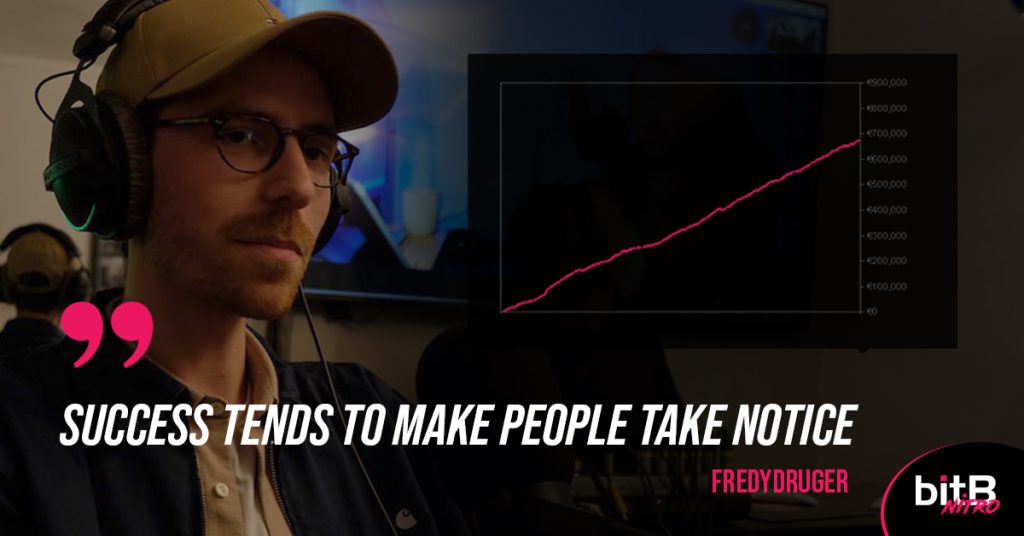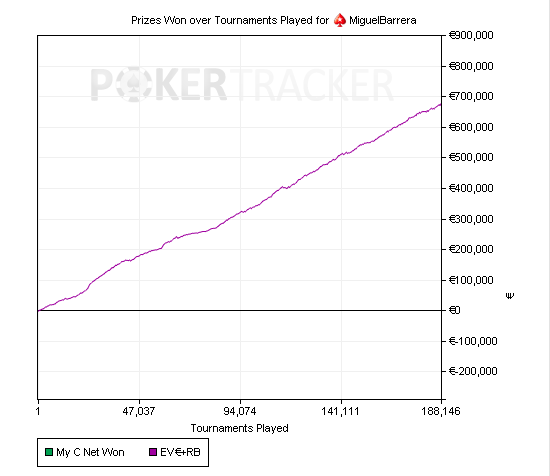“Success tends to make people take notice” – Interview with Quentin Krug-Basse, aka Fredydruger
Quentin went from home games and 1c/2c online cash games to beat the highest stakes in spins, and he made sure every opponent knew when he got there.
FROM CASUAL TO HIGH STAKES SPINS PRO
bitB Spins: Can you describe your journey from playing poker casually to deciding to pursue it professionally?
Fredydruger: I started playing poker for fun around my 18th birthday. Over the years, I had a few attempts, each lasting 3 to 6 months, at becoming a regular at small stakes poker—first when I was 19, and then again around 21.
In my early years, I was playing when I wanted and had time but had limited success, leading me to take breaks from the game. However, my more serious pursuit of poker began at age 24 when I started playing spin and go tournaments. This marked my transition towards a professional mindset, focusing heavily on playing regularly, studying the game, and following my coach’s advice.
With enough savings to support myself for several months, I embarked on my professional journey with 25-cent spin and go’s around 2015 or 2016. Since then, I’ve steadily climbed the stakes. Now, after 6 to 7 years, I consider myself a professional spin and go player.
TRANSITIONS BETWEEN SITES
bitB Spins: Which sites have you played on throughout your poker career, and what motivated your moves between them?
Fredydruger: I began my poker journey on Winamax before moving to PokerStars. My playtime alternated between these platforms, spending a year or two on each before exploring new opportunities.
2019 I started playing Nitros right after their launch but soon returned to Pokerstars.fr. The shift was driven by an incredibly high rakeback offer, almost close to 100% for about three years, which was an opportunity too good to pass up.
I was really successful on PokerStars in that period; I transitioned from a regular player to a high-stakes professional, becoming one of the most successful players in my game type. Before 2019, I would describe myself as an average player, but in the following years, my poker career skyrocketed.
However, changes in PokerStars’ rakeback system in March 2023 prompted me to switch back to Winamax and join bitB Spins.
Fredydruger’s (aka MiguelBarrera, aka Quentin) all-time PS winnings.
STUDY ALONE OR COACHING?
bitB Spins: How did you approach learning and improving your poker skills? Did you primarily learn on your own or seek external guidance?
Fredydruger: I didn’t rely solely on self-learning but heavily invested in coaching and mentoring throughout my poker career. Initially, I was part of a stable for about four years, from 2015 until mid-2018.
After a brief period of going solo, I joined another one, which introduced me to new strategies and perspectives. I appreciated the opportunity to learn from each environment, recognizing that both had their strengths and weaknesses.
My first stable laid the foundation for me, teaching me not only the basics of poker but also how to approach the game professionally, including study habits, work ethic, scheduling my life, mindset, and other off-the-table disciplines. In contrast, the second stable I’ve been a part of focused on advanced strategies, specifically high-stakes GTO play, which wasn’t suitable for beginners and significantly contributed to my development as a player.
Later, I joined bitB Spins, which offered access to various coaches and approaches, mainly focusing on gameplay against less skilled players or VIPs and encouraging a high volume of play.
This diverse experience across different schools was invaluable. While I did make some personal discoveries along the way, the bulk of my learning and success came from following the advice of smarter, more experienced individuals.
Fredydruger had his fair share of success at bitB Spins.
BECOMING WELL-KNOWN
bitB Spins: You are well-known in the French poker community. Has that been something you’ve thrived for or a byproduct of high-level engagement on your part?
Fredydruger: I’ve always been active in online communities, engaging in Discord servers, forums, and Twitch streams. Initially, my presence might not have drawn much attention, but over time, as I shared my results and participated more, my reputation began to grow.
Success tends to make people take notice; they listen to and trust what you have to say more. I’ve also maintained blogs and streamed my gameplay, which helped increase my visibility, especially within the smaller French gaming community. Streaming, particularly high-stakes games, naturally attracts more attention.
My participation in the community has helped people get to know me. I believe my honesty has played a significant role in why people might like me. Unlike some who aim to profit by selling overpriced coaching or materials, I’ve never pursued such avenues; I prefer genuine interactions.
In the past, I’ve always been open to discussing and giving advice, recommending coaches, or guiding people to resources, even if it meant directing them to competitors.
I’ve also been vocal about issues within the community, especially cheating and botting, challenging the prevailing, for the lack of a better term, ‘omerta’—a code of silence that protects cheaters and botters in poker communities.
This silence isn’t just among players but extends to the broader community, where issues like botting in high-stakes games are widely known but rarely addressed. I’ve always taken the opposite stance, speaking out against injustices and corruption, which has earned me a level of trust and respect.
Perhaps some appreciate me simply because of my success in high-stakes games. Still, I think my honest and forthright approach to the community and willingness to tackle tough issues are the main reasons people value my opinion.
STUDYING AND GRINDING
bitB Spins: What is your approach to studying poker, and how much time do you currently spend on it?
Fredydruger: Last year (2023), my playing time was on the lower side, around 50 to 60 hours a month, due to other commitments. Now, I’ve ramped it up to about 100 to 120 hours per month, averaging 25 to 30 hours a week. This has been my norm throughout my career.
I’ve never been one to log 150 to 200 hours monthly. Sure, there have been times when I hit 150 hours, but those were exceptions. The idea of playing 200 hours a month? That’s just not me. I want to show that it’s possible to reach high stakes without dedicating every waking moment to the game.
As for studying, I’ll be honest—I’ve only put in about 3 to 5 hours this year, coaching sessions included. It’s not something I’d advise others to do, especially if they are at the beginning of their spin journey. I know I should be doing more, aiming for 3 to 4 hours of weekly study.
However, at a certain point in your career, playing more can be more beneficial than studying. There was a time when I was more focused on studying, especially when moving up to higher stakes, but I’ve never been the type to spend countless hours with solvers.
My passion for poker is enough to make it my profession, but not to the extent that it consumes 18 hours of my day. I believe in finding a balance that works for me.
Enjoying the Après with russian regs money 😎 pic.twitter.com/NO884OFjFb
— fredydruger (@fredydruger1) February 8, 2024
He always makes sure to rest, relax, and thank his donors.
BUMHUNT OR CONSISTENT GRIND?
bitB Spins: How do you manage your game selection and volume to maximize benefits like rakeback without compromising your personal time?
Fredydruger: Well, first of all, I would say that my approach was never really focused on maximizing profits but rather maximizing profits while inputting the least amount of effort possible. I’m a lazy guy, remember? That means my game selection was never really the best.
Also, I don’t mind to regwar and had to defend several lobbies against opponents. During those periods, I did not really care about game selection.
At the moment, it’s pretty simple. Starting the month, I decide how much volume (rake) I need to play to reach the monthly bonuses I’m looking for, and then I schedule hours accordingly. I play a lot of different buy-ins, from 25s to 500s, but I mostly try to focus on the highest stakes so my goals are reached in a shorter time.
On a day-to-day basis, that means pretty much no game selection, so that’s probably not the best in terms of €/game or even €/hour, but it has the huge benefit of clearing my mind of all those concerns about game selection. Finding and very often waiting for the perfect game is a pain in the ass.
In the past, I spent countless nights in front of my computer trying to optimize the perfect leaderboard score or get the most drunk VIPs, and I’m very happy to be done with it. Scheduling is awesome and actually gives you more freedom than the opposite.
At the beginning of my poker career, I really enjoyed the freedom it gave me—not having a boss or a schedule. Nowadays, I prefer to have a schedule, as it makes my life so much easier. Not to mention that I had the worst sleeping patterns until this year; now, I sleep like a well-fed cat.
He earned the highly coveted Platinum Pass on PokerStars and, with it, a ticket to the 2023 PokerStars Caribbean Adventures.
It’s happening !! Good luck to me and worst luck for everyone else 🤭 pic.twitter.com/bbJ99SlBuR
— fredydruger (@fredydruger1) January 30, 2023
ADVICE FOR LOWER STAKES PLAYERS
bitB Spins: What advice would you give to players currently at lower stakes who aspire to reach high stakes in today’s poker environment?
Fredydruger: I began playing spins when the competition was much softer. Initially, coaches advised that playing two or three tables simultaneously was feasible until reaching higher stakes, when you could decide whether to add more tables. This approach was definitely manageable back then, but the landscape has changed, making it less viable today.
Upon my return to Winamax and joining bitB Spins, my extensive experience in high stakes was recognized, allowing me to bypass the proving grounds of lower stakes. This trust from the team meant I didn’t need to endure grinding through low- and mid-stakes.
Currently, I dedicate a few hours each week, about 2-3 hours, to practice my skills at mid-stakes, ensuring I’m prepared for any shifts in the higher stakes scene. However, for those currently playing at lower stakes, such as the 10s or 25s, the path to high stakes is different.
Achieving success in today’s environment likely requires enduring a phase of playing numerous tables, generating significant volume, and dedicating many hours to the game.
As players reach higher stakes, where the action is less dense, the necessity for multi-tabling diminishes, allowing for a focus on fewer tables with larger buy-ins. But reaching this point directly from the start seems increasingly challenging due to shifts in the poker and spins economies over recent years, particularly at the middle stakes, where volume plays a crucial role.
ROLE OF MINDSET COACHING
bitB Spins: What is your opinion on the role of mindset coaching in poker, and how has your perspective evolved over your career? How do you manage emotions and tilt during your poker sessions, and what impact do they have on your gameplay?
Fredydruger: With experience, I’ve learned not to dwell on the outcomes of my games too much. Yes, I still get emotional; I’m not immune to frustration when things don’t go my way, but it doesn’t drastically affect my gameplay. I might make minor adjustments in response to my feelings, but I don’t let them lead me to make significant mistakes.
Interestingly, I’ve observed some high-stakes regulars making tilt-induced errors, which I find unprofessional and something that belongs to lower stakes.
Personally, I don’t use a mindset coach, nor do I engage in mindset coaching. My view on mindset coaching in poker is somewhat critical; I see a lot of it as unnecessary, especially when basic principles can be learned from resources like Jared Tendler’s book on poker mindset, which I find comprehensive for most players’ needs.
I question the value of spending heavily on personal mindset coaching, particularly for high-stakes players already performing well. While some argue that even minor advantages can translate into significant financial differences at high stakes, I believe that a fundamentally sound approach to poker, including addressing any major tilt issues early in one’s career, is more crucial than ongoing mindset coaching.
While I see the value in one-on-one coaching for addressing significant challenges, I also believe the mindset coaching industry might be oversaturated. It’s not that I’m entirely against mindset coaching or think it lacks value. Occasionally, I might find it beneficial to seek such coaching for specific issues. However, I don’t see myself needing or wanting regular sessions.
Over the years, I’ve shifted from focusing on mindset routines and now view them as less critical to my daily practice. This doesn’t mean I find mindset irrelevant, but rather that it should be one of the basic skills a player develops, akin to knowing preflop ranges. It’s essential but not something that needs constant, intense focus throughout a player’s career.
My approach may not align with everyone’s, but it’s based on my experiences and how I’ve learned to manage the psychological aspects of poker alongside improving my technical skills.
I’m not playing high rollers with millions of euros on the line and stuff like that. I’m just playing spins, you know. For sure, it’s competitive, but it’s not as competitive as some sports where people really dedicate their life from 8 years old to 18, and 1 out of 50 guys will actually make it.
Poker is quite easier than being a professional football player or being the next Roger Federer, so yeah, it’s not that important. Poker is tough, but it’s not that tough.
FUTURE OF POKER AND SPINS
bitB Spins: What’s your take on the future of poker and spins, especially as the game evolves and becomes more challenging?
Fredydruger: Encouragingly, I’d tell players not to give up and give in to the common pessimism surrounding poker. Despite opinions to the contrary, poker and spins are very much alive, and it’s not too late to get involved.
It’s true that the games are evolving and becoming more challenging, but this shouldn’t be a deterrent. Concerns about cheating, AI, and the increasing number of players are valid.
Yet, it’s crucial to remember that the quality of coaching and resources available today also improves, offering players better support than ever.
There’s a natural cycle in poker, with new players joining as veterans retire, ensuring there’s always space for new talent. The poker landscape is dynamic; the top players from a decade ago have mostly moved on, and those excelling today are relatively new to the scene, with many having less than 5 or 6 years of experience. This turnover highlights an opportunity for anyone committed to learning and improving.
So, the message is clear: don’t be discouraged by the evolving challenges of poker—there’s room for everyone willing to put in the effort and hone their skills.
FAILING IS PART OF THE PROCESS
bitB Spins: What advice would you give players struggling with transitioning between stakes, especially when facing setbacks or demotions?
Fredydruger: In the realm of poker stakes, the transition from 10s to 20s or 25s marks a significant leap. This is primarily because 20s and 25s are often where players can truly start to make a living, attracting a more serious and professional demographic compared to the semi-professional presence at lower stakes. The competition gets harder, and it’s much more important to approach regulars and less skilled players differently.
Interestingly, the skill gap isn’t as pronounced across all levels; sometimes, players at 50s can be better than those at 500s, highlighting that the challenge isn’t necessarily about skill alone but also about navigating a higher density of competitive players.
Failing is part of the process. It’s normal to face setbacks, like moving between stakes multiple times before finding your footing. These experiences are not only common but essential for growth and resilience in poker. Keep pushing through, adapt, and eventually, success in higher stakes becomes achievable.




